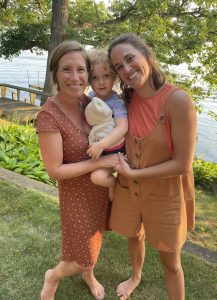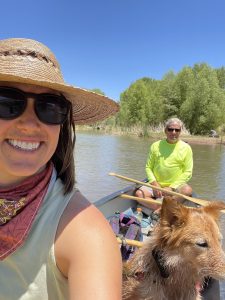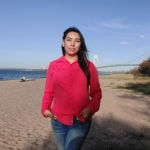Grace Fullmer
Originally from Arizona, Grace Fullmer (she/her) now lives and works in Colorado, on Diné, Pueblos, and Ute lands.
Grace joined River Network in 2022. She is the Corporate Engagement Manager and supports the corporate partnerships program by connecting with local partners to implement programs that enhance and protect water quality for all.

My two favorite gals, sister and niece, on the shores of Big Lake in Wisconsin
Grace earned her Bachelor of Science degree in Environmental and Organismic Biology from Fort Lewis College in Durango, CO, and her Master of Science in the Human Dimension of Natural Resources from Colorado State University. Since receiving her bachelor’s degree, Grace has traveled extensively around the world volunteering and working for a variety of environmental organizations, supporting everything from coral reef restoration in Indonesia to environmental education in Nicaragua. As well, she has worked for numerous organizations in the US focusing on equitable community engagement to ensure natural resource projects are serving not only the surrounding natural environment, but also the wellbeing of human communities. Outside of work, Grace is found exploring all sorts of landscapes with her shepherd mix Coya, stitching embroidered southwestern plants and animals, spending quality time with her community of family and friends, and when she gets the chance, going on nature walks with her niece (have to start them young!).
Which River Network value most speaks to you?
I believe the wellbeing of both water and human communities lies within the value of balance. When approaching my work in engagement, I strive to ensure that the needs of the natural world and the surrounding community are equally understood and incorporated into natural resource projects. In order to see lasting impacts for water and the people that depend on it, I think balance helps us to achieve mutually beneficial results for generations to come.
What motivates you to go to work everyday?
My passion and commitment to place and people is what motivates me to go to work everyday. I love being part of a space that helps create pathways for people to become stewards of their own backyard. As well, I appreciate working alongside seasoned professionals who bring their own experiences to the table, creating an element of non-stop learning and growth.
What called you to work in water?
Growing up in the arid southwest deserts of Arizona, I learned to appreciate every drop of water from a very young age. From my childhood experiences living in a non-stop drought, up into adulthood living in flood-prone areas, it has always been an obvious step to work in water. I believe water is what nurtures and unites us all, and I couldn’t be more thrilled to be part of ensuring its health and longevity.
Why is equity, diversity, and inclusion (EDI) important in your work?
Within community engagement, EDI is at the forefront of each aspect of my work. I believe similar to how a wide range of plant and animal species make for a strong and healthy environment, it is critical to have, and make accessible, ALL voices represented at the table for a more equitable and inclusive present and future. It takes an ENTIRE community to relevantly tackle our worlds’ environmental problems, and taking the necessary steps to engage everyone is key.
What was your earliest memory around water?
While I grew up in Arizona, half of my family roots are tied to the lakes of Minnesota and Wisconsin. I spent my summers swimming in the waters of big lake: jumping off the dock, getting “eaten alive” by the scratchy weeds, collecting shiny stones, listening to the call of the loon at sunrise, and watching the sunset cast vibrant colors across the water. Big Lake is where I became a water person, and it is what sustains me as such to this day.
If you didn’t work in water or conservation, what would you be doing?
This is very difficult for me to imagine, but I would most likely be a grief therapist. I appreciate listening to people, and holding space in some of life’s most challenging moments.
How do you think the conservation community can make the biggest impact?
Within the western/modern world, we have become disconnected from our natural environment. Many of us are surrounded by concrete, asphalt and buildings. What would it be like if individually, we each held a special connection and duty to the natural beauty that surrounds us? I think that is the first step, and from there so much is possible.

Canoeing with my dad and pup on the Verde River in central AZ (we had life jackets!)
How do you recharge outside of work?
Luckily my pup Coya is very needy, requiring everything from hours of pets and cuddles, to long days spent in the backcountry. Everything that I need, too. When we aren’t out identifying plants and birds, I like to cozy up on the couch with an embroidery project while listening to calm music. Or, I attempt to make a Mexican dish that will never compare to my favorite Mexican food restaurant in Prescott.






